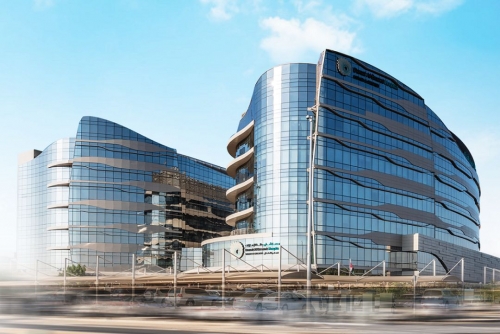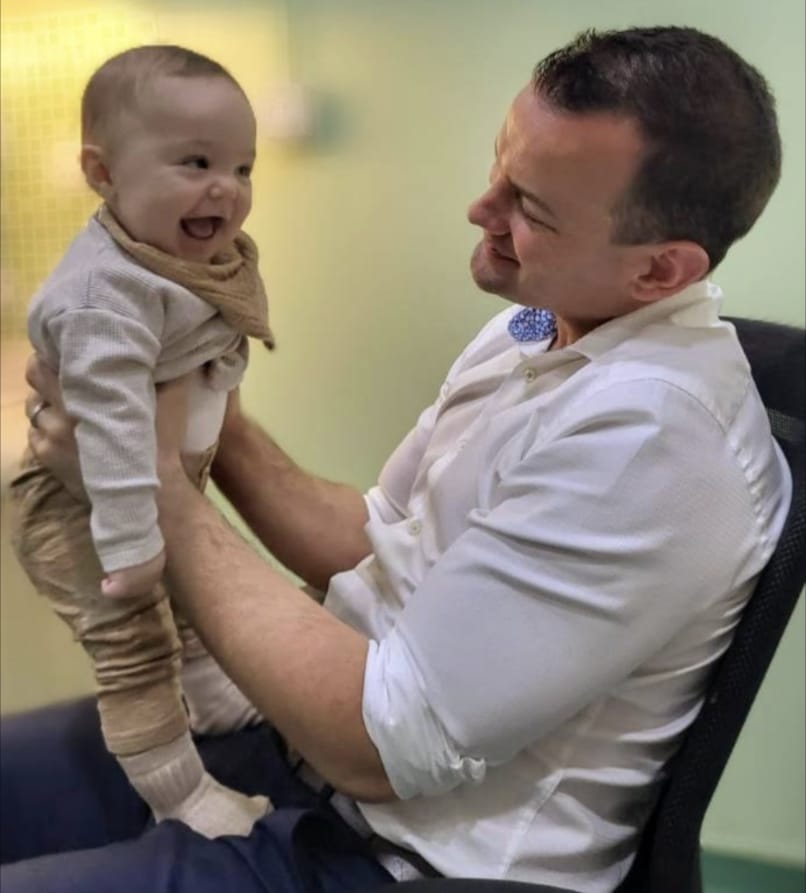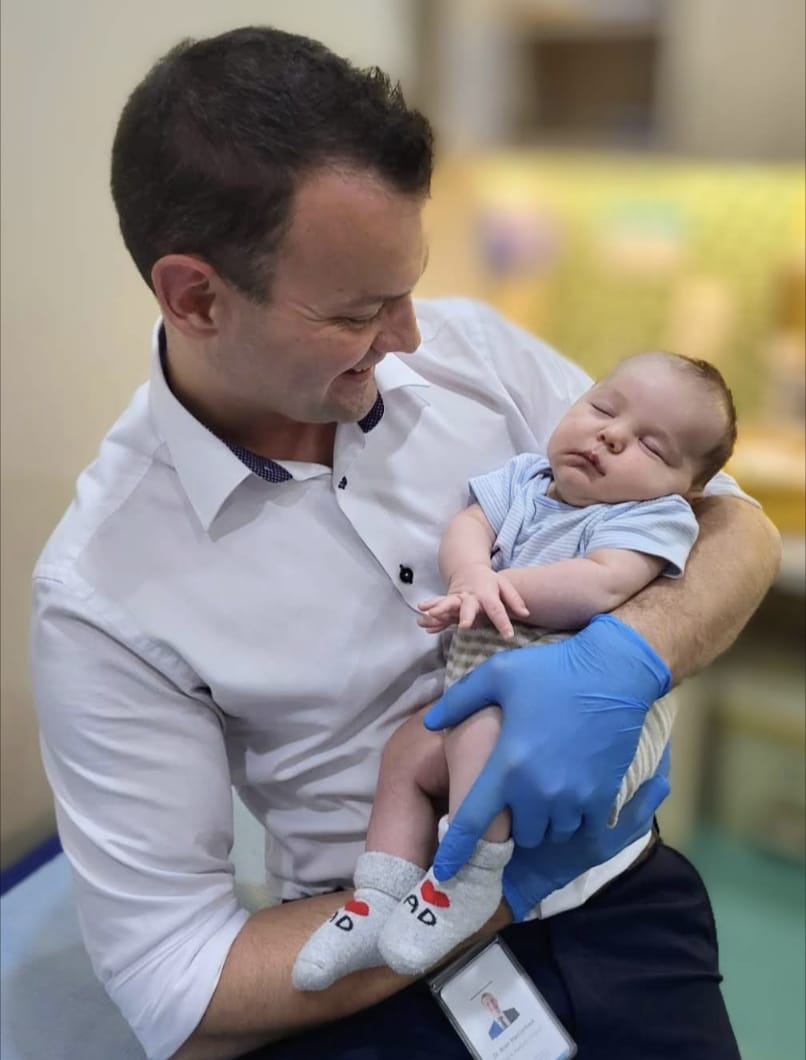Baby Kai triumphs over rare congenital condition at M42’s Danat Al Emarat Hospital for Women & Children
TDT | Abu Dhabi, United Arab Emirates
The Daily Tribune - www.newsofbahrain.com
The arrival of a newborn is a moment of unparalleled joy for parents. However, for German couple Tim and Sarah, employees of a UAE-based airline, this joy was tempered by worry when their first child, Kai, was born with a rare and life-threatening congenital condition: Tracheoesophageal Fistula (TEF) with Esophageal Atresia (EA).
When Kai was born, it was clear something was not quite right. He struggled to swallow his saliva, which dribbled from his mouth, and his breathing was consistently faster than normal. The neonatal team at Danat Al Emarat Hospital for Women & Children quickly intervened, inserting a small tube into Kai’s mouth to clear the oral cavity. In a healthy newborn, this tube would pass unimpeded through the esophagus into the stomach, but in Kai’s case, it curled up high in his chest, indicating a blockage.
TEF with EA occurs in about one in 4,000 live births. For sufferers of this condition, the upper part of the esophagus doesn’t connect to the lower part, and an abnormal connection (fistula) exists between the lower esophagus and the trachea (windpipe). This meant that every time Kai breathed, air could enter his stomach, and gastric acid could potentially reflux into his lungs, posing significant health risks. Without treatment, this condition is life-threatening.
Tim and Sarah were introduced to Dr. Brian MacCormack, a highly skilled consultant pediatric and neonatal surgeon at Danat Al Emarat Hospital for Women & Children, part of the M42 group. He explained the condition and the urgent need for a thoracotomy (where the chest is opened) in the first few days of Kai’s life. Although the condition was not immediately life-threatening, surgery was necessary within 24 to 48 hours to prevent severe complications later on. Dr. MacCormack reassured Kai’s parents that he would be stable for 12 to 24 hours with a tube in place, which prevented feeding but kept his condition manageable. However, delaying the surgery would significantly increase the risks involved.
A technically demanding procedure
Dr. MacCormack said, “Kai’s parents were understandably shocked and very worried when we sat down on the first day of his life to discuss all of these points. We sat together for some time so that all their questions could be answered. I drew some pictures and explained the procedure in detail, along with the risks and his expected journey before, during and after the procedure.”
The next day, the surgical team prepared for the complex procedure. The goal was to connect the two ends of Kai’s esophagus. The gap was moderate, about the length of three vertebrae. The surgery involved a right-sided thoracotomy, opening the chest between ribs four and five. Dr. MacCormack used a muscle-sparing technique to avoid cutting through major muscles, which would aid in Kai’s long-term recovery.
“This is one of the most technically demanding procedures that we perform as neonatal surgeons,” Dr. MacCormack explained. “The surgery began with the crucial step of disconnecting the esophagus from the airway, a life-saving maneuver. Once the airway was secured, I successfully connected the two ends of the esophagus using a tube passed through the nose, down the joint and into the stomach. This tube facilitated feeding and maintained the connection during the healing process.”
Kai remained stable throughout the surgery and was closely monitored in the full-fledged neonatal intensive care unit, one of the largest units in the UAE. Over the next few days, the medical team watched for any complications, but Kai did exceptionally well. He was taken off the ventilator within a couple of days and began feeding through the tube. Soon after, he started feeding again normally by mouth.
“After a roller-coaster of a week, Kai’s parents finally took their first-born baby home to enjoy him,” Dr. MacCormack was happy to report. “Since then, we have been regularly reviewing Kai in the clinic, and it is such a joy to see him now thriving and starting to take solids at six months. This is not the end of the journey for Kai and his parents, as this condition can cause problems throughout his entire life. Unfortunately, he will need to remain under regular review as he ages. However, the family has been wonderful and it was a privilege for me to perform the operation.”
Kai’s father praised Dr. MacCormack’s skills, saying, “We are immensely grateful for the care and expertise provided by Dr. MacCormack and the entire team at Danat Al Emarat Hospital for Women & Children. Their dedication and professionalism have given us the greatest gift—the health of our son.”
Despite the success of the surgery, Kai may face future challenges. Children with repaired EA often have a degree of tracheomalacia, where the trachea is somewhat floppy. This can cause a persistent cough, which could worsen when he has a cold or any other respiratory infection. However, with careful monitoring and management, these issues can be handled effectively. Kai’s parents will be connected to a support group which provides invaluable help for children with rare conditions such as Kai’s.
To learn more about Danat Al Emarat Hospital for Women & Children visit, https://danatalemarat.ae/
To book an appointment at Danat Al Emarat Hospital for Women & Children, call 800 96626
Related Posts



